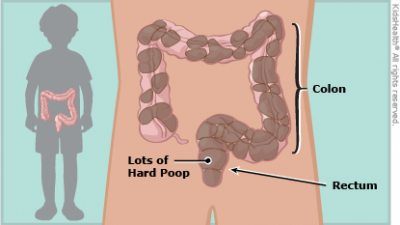Is It Constipation?
Constipation is when a child has delayed passage of stools. The stools are often very hard, dry, and difficult to pass. Constipation is a very common complaint in kids and often among the top 10 reasons for doctor’s office visits.
If you have an infant and are looking for specific information on Infant Constipation, read our article HERE.

Symptoms of constipation can include:
- Less than three bowel movements a week
- Bowel movements that are hard, dry and difficult to pass
- Pain while having a bowel movement
- Stomach pain, cramping, or bloating
- Traces of stool in your child’s underwear — a sign that stool is backed up in the rectum
- Showing signs of holding stool
- Blood on the surface of hard stool
Constipation occurs when stool moves too slowly through the digestive tract. As stool moves slowly throughout the large intestine, too much water is absorbed leaving the stool hard and dry. The hard stools become painful to push out and the child becomes fearful of having bowel movements. There can then be retention of stool and dilation of the colon. As a result of the dilation, there can be a loss of sensation of stool in the colon and leakage of stool with visible stains in their underwear can occur.

Factors contributing to constipation can include:
- Stool withholding – Your child may ignore the urge to have a bowel movement because he or she is afraid of the toilet or doesn’t want to take a break from play. Some children withhold when they are away from home because they are uncomfortable using public restrooms. Painful bowel movements caused by large, hard stools also may lead to withholding. If it hurts to stool, your child may try to avoid a repeat of the distressing experience.
- Toilet training issues – If you begin toilet training too soon, your child may resist and hold in stool on purpose. If toilet training becomes a battle of wills, a voluntary decision to ignore the urge to stool can quickly become an involuntary habit that’s tough to change.
- Changes in diet – Eating too many foods that are high in fat and not eating enough fiber-rich foods can cause constipation. Not drinking enough water and other fluids can also cause constipation. One of the more common times for children to become constipated is when they’re switching from an all-liquid diet to one that includes solid foods.
- Changes in routine – Any changes in your child’s routine — such as travel, hot weather or stress — can affect bowel function. Children are also more likely to experience constipation when they first start school or childcare outside of the home.
- Emotional issues – Feeling stressed because of school, friends, or family can cause constipation.
- Medical conditions and medications – Rarely, constipation in children indicates an anatomic malformation, a metabolic or digestive system problem, or another underlying condition. Certain medications, such as iron supplements, some antidepressants, and narcotics can cause constipation.
Treatment of constipation:
Treatment of constipation is dependent on the child’s symptoms, age, and general health. Treatment includes dietary and lifestyle changes. It will be important to add more fruits and vegetables to the child’s diet. Increasing exercise can also be helpful.
Foods Rich in Fiber:
- Breads/Cereals: whole-wheat bread, whole-grain waffles, wheat bran muffins, oat bran cereals, granola, popcorn.
- Legumes: kidney beans, navy beans, pinto beans, black beans, lima beans, lentils, chickpeas, black-eyed peas, garbanzo beans.
- Vegetables: cauliflower, broccoli, celery, potatoes with skin, green peas, green beans, carrots, asparagus, artichokes, cucumbers, summer squash, parsley, Brussels sprouts, avocado.
- Fruits: apples with peel, raspberries, oranges, nectarines, pears, blackberries, blueberries, strawberries, tomatoes, dates, raisins.

Contact healthcare provider:
Be sure to contact your child’s healthcare provider if constipation symptoms are not responding to lifestyle and diet changes. It is important to remember that acute constipation can become chronic and lead to further complications.
Therefore, if the symptoms are lasting longer than 2 weeks, contact your child’s healthcare provider. The provider should also be contacted if the child cannot get the stool out with normal pushing, there are painful tears around the anus, or if there are changes in urination (bed-wetting).
Sometimes constipation can be managed safely with over-the-counter fiber supplements and stool softeners. An urgent call to your provider’s office should be made if there is abdominal pain with fever and vomiting.
